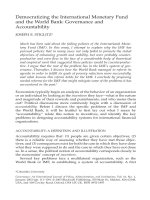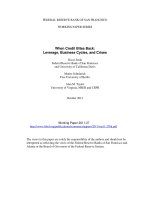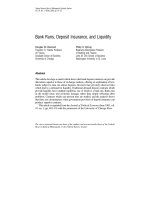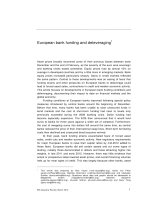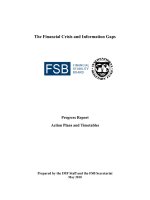Internal Control and Cash pptx
Bạn đang xem bản rút gọn của tài liệu. Xem và tải ngay bản đầy đủ của tài liệu tại đây (248.29 KB, 45 trang )
Internal Control and
Cash
Chapter 8
Define internal
control.
Objective 1
Internal Control
What is internal control?
It is the organizational plan and all the
related measures that an entity adopts to…
–
safeguard assets,
–
encourage adherence to company policies,
–
promote operational efficiency, and
–
ensure accurate and reliable accounting
records.
Operational Controls
Financial Reporting Controls
Internal Control
Tell how to achieve
good
internal control.
Objective 2
Establishing an Effective System
of Internal Control
Characteristics of an effective internal
control system include:
1
Competent, reliable, and ethical personnel
2
Assignment of responsibilities
3
Proper authorization
4
Separation of duties
Separation of operations from accounting
Separation of the custody of assets from accounting
Separation of the authorization of transactions
from the custody of related assets
Separation of duties within the accounting function
Separation of Duties
Stolen credit card numbers
Computer virus and Trojan horses
Impersonation of companies
Internal Controls for
e-Commerce
Internal Controls for
e-Commerce
What is an encryption?
It is the primary method of achieving
confidentiality in e-commerce.
Plain-text messages are rearranged by some
mathematical process.
The encrypted message cannot be read by
anyone who does not know the process.
Internal Controls for
e-Commerce
The Internet Corporate Intranet
Firewall
Network
Computers
The Limitations of
Internal Control
Most internal control measures can be
circumvented or overcome.
Collusion is when two or more employees
work as a team with the purpose to defraud
the firm.
The Bank Account as a
Control Device
Documents used to control a bank account
include:
–
signature card
–
deposit ticket
–
check
–
bank statement
–
bank reconciliation
The Bank Reconciliation
What are two records of a business’s cash?
1
Cash account in the business’s own general
ledger.
2
The bank statement which tells the actual
amount of cash the business has in the bank.
The Bank Reconciliation
Items recorded by a company not on the
bank statement:
–
deposit in transit
–
outstanding checks
The Bank Reconciliation
Items on a bank statement and not recorded
by the business:
–
bank collections
–
bank fees
–
interest earned on account
–
NSF checks
The Paths That Two Checks
Take (Good Check)
Μaker
writes check
to payee.
Payee
deposits check
in bank.
Payee’s bank
sends check to
maker’s bank.
Maker’s bank
pays the check.
The Paths That Two Checks
Take (NFS Check)
Maker’s bank
balance is not
sufficient to
pay the check.
Maker’s bank
sends the
worthless
check back to
payee’s bank.
Payee’s bank
decreases payee’s
balance.
Payee holds
worthless
check.
Prepare a bank reconciliation
and the related journal
entries.
Objective 3
The Bank Reconciliation
Example
At the beginning of July, Sahita, Inc.
received the June’s bank statement.
It indicated the following:
The bank balance was $63,275.
The bank had collected a note receivable
from one of Sahita’s customers in the
amount of $1,325.
The Bank Reconciliation
Example
The bank paid the electric bill of $1,500.
There was a $200 check returned for NSF.
Interest earned on the account was $265.
Bank service charges were $12.
The Bank Reconciliation
Example
Sahita’s books indicates a cash balance
of $66,647.
A deposit of $11,250 was mailed to the
bank on June 30.
Checks issued in June for $8,000 have
not yet been paid by the bank.
Balance per bank, June 30 $63,275
Add deposit in transit 11,250
$74,525
Less outstanding check 8,000
Adjusted bank balance $66,525
The Bank Reconciliation
Example
Balance per books, June 30 $66,647
Add: Note receivable
collected by the bank 1,325
Interest income 265
$68,237
Less: Payment of electric bill 1,500
NSF check 200
Service charge 12
Adjusted book balance $ 66,525
The Bank Reconciliation
Example
The Bank Reconciliation
Example
Balance per books
$66,525
Balance per bank
$66,525
Equal amounts
Record Reconciling Items
June 30, 200x
Cash 1,325
Notes Receivable 1,325
Notes collected by the bank
June 30, 200x
Cash 265
Interest Income 265
Interest earned on bank balance



